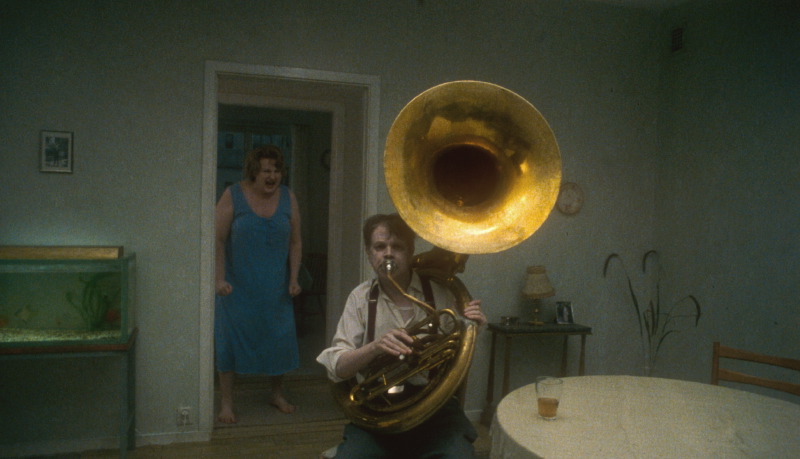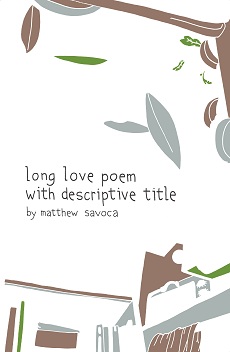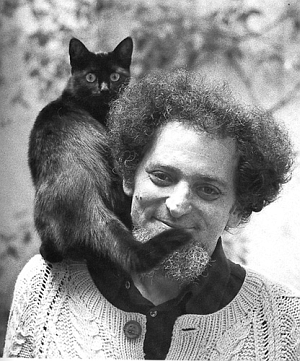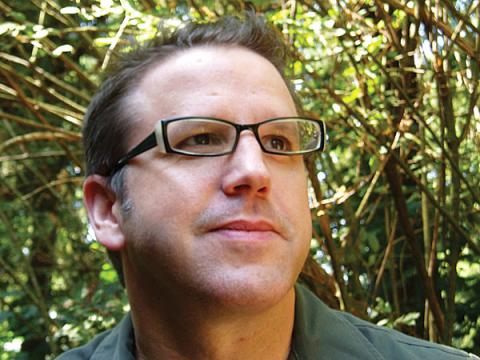Malone & Savoca Week (5): Kendra & Matthew Interview Each Other

(note: Kendra’s keyboard is broken so none of her text is capitalized. She would really like it if someone wanted to buy her a computer.)
Matthew: Can you briefly describe the timeline of events surrounding the entirety of Everything is Quiet, from inception to publishing, including the total amount of time that the poems span?
Kendra: okay. four years ago i moved to new york for a job. three years ago i got laid off from that job. three years ago i started drinking everyday and writing a lot because i wanted to just use up my savings instead of getting another job. two years ago, or maybe a little more i started submitting things to magazines. a year ago i compiled a manuscript. six months ago jeremy spencer accepted the manuscript and told me he was releasing it in six months so i could be released with you. i think the poems span about three years of my life. some go back a little farther. some don’t really have time frames at all.
most of your work is grounded in the quietness of domestic life, and the listless struggle of it all. do you ever intend to do this? how does your domestic partner(s) view your work?
Matthew: I’m pretty sure that I don’t intend it in the sense that it is something I really try to convey. What I’m usually trying to do is “get things right”. It’s a whole lot different from “make things right” which I think has more in common with the general idea of being deliberate, which I am not.
I think my domestic partner probably views my poetry as something good that it is “doing something” – that’s a phrase she has used before – but she also feels bored sometimes in reading about her own life, and then other times she enjoys it in the way we all do, and then in one final way, when she reads it she learns things that I was thinking and feeling that she was unaware of previously.
Malone & Savoca Week (4): Our Cat Comes With Memories of Her Own: A Discussion of Kendra Grant Malone’s Everything is Quiet
 “i like the feeling you get / from lies through omission / they make you feel / like a weird little / phantom”
“i like the feeling you get / from lies through omission / they make you feel / like a weird little / phantom”
One of the poems early in Kendra Grant Malone’s collection, Everything Is Quiet, talks about that moment after a good movie when we all have to accept the movie wasn’t real. When two people hang out in that moment, it’s excruciating, because they know “you have to / speak at some point / and you have to shatter / what you were just feeling / a moment before.” Much later in the collection, the speaker—let’s just say Malone because that’s what Malone says—talks about people who are “very beautiful” and other people who are “very drunk,” but ends talking about how she has no one to talk to “at this very / moment.” And it’s that isolation of Very-flavored moments that this book lives to talk about. Even though these spindly, skinny poems are gorged with excesses of violence (sexual and otherwise), excesses of ingestion and injection, their main concern is excessive solitude. Which gets no worse than when two people who want to be together are stuck living through those moments they don’t want to be together. READ MORE >
September 23rd, 2010 / 7:37 pm
Malone and Savoca Week (2): A Conversation with Matthew Savoca
I enjoyed Matthew Savoca’s long poem, Long Love Poem With Descriptive Title, and for Malone and Savoca Week, I interviewed him about it and some novels he’s written. Our talk is almost 3400 words long (edited from ~6,000) and requires no preamble, so let’s get to it. Here is the book cover:
 Adam: OK, I want to ask you about Long Love Poem With Descriptive Title. Ready?
Adam: OK, I want to ask you about Long Love Poem With Descriptive Title. Ready?
Matthew: Yes, let’s do it. I’m drinking a beer.
Adam: Okay, nice. First of all, can I call you the speaker?
Matthew: Yes.
Adam: Oh good. I feel like people make that very complicated.
Matthew: I am definitely the speaker, and I’m not trying to hide it.
Adam: Are you crazy?
Matthew: In what way?
Adam: Well, we should talk first about how much you’ve written.
Matthew: Okay.
Adam: How much have you written? READ MORE >
September 21st, 2010 / 9:49 am
Natalie Lyalin Week (4): Guest Post by Seth Landman
 Today’s lovely Lyalin post is by the talented and dedicated Seth Landman, poet, editor of Invisible Ear, and basketball enthusiast.
Today’s lovely Lyalin post is by the talented and dedicated Seth Landman, poet, editor of Invisible Ear, and basketball enthusiast.
Before Landman takes it away, remember that you can buy Natalie’s book, Pink & Hot Pink Habitat, here. Giveaway possibilities are described here.
So, here Seth excerpts a poem and comments on it.
The world was not yet discovered.
It traveled in a galaxy of dinosaur bones and other fossils.
Embedded and waiting. Waiting for decades
when the skirts were different.
When Mr. O watered his plants in a light blue shirt with a breast pocket,
His hair slicked back, he boarded a plane to Africa, where the lion still
walked in bursts of grass.
In his light blue rental car, Mr. O took photos, very close photos, of lions resting.
There was nothing to report back.
The world lay silent. The giant squid was silent.
The continents were silent. It was quiet as he boarded the plane for home.
It was quiet in the diamond mines, it was quiet in the coal mines,
And the Loch Ness monster sighed and waited for sonar.
Natalie Lyalin Week (1): A Poem, An Interview
This week, I along with other contributors will throw down with Natalie Lyalin, editor of GlitterPony and author of the next book of poems that you should buy: Pink & Hot Pink Habitat (Coconut Books). Buy it here. There will be opportunities to WIN Natalie’s book along with other books from the tremendous Coconut catalog, so stayed tuned for that. This will be like a party on the internet. A party that starts with a poem and follows that with an interview to which the poem is relevant. So, to begin.
GREAT SOPHIAS
There were two great Sophias
and a few good Dorothys. We enacted
inside the outside world of the mausoleum.
The mausoleum is by my house,
and I thought it was ordinary. I thought
it was all ordinary. I was Sophia,
but not so good at it. I loved Dorothy.
On the lake, the small swans stood on water.
I stood under a tree. Someone occupied the
peace pagoda. It is not always certain,
a safe exit from the forest.
I believe their show was the first
to address homosexuality. Dorothy
loved the way she dressed.
They were dressed impeccably.
Because Natalie’s book gave me lots to think about concerning gender and place, these were the starting points of the interview, after the jump. READ MORE >
Kevin Sampsell Week (4): A Common Interview by Michael Kimball
Kevin Sampsell lives in Portland, Oregon and works at Powell’s Books. He started the press, Future Tense Books, in 1990 and has published many writers including Mike Topp, Zoe Trope, Chelsea Martin, Susannah Breslin, Elizabeth Ellen, and Claudia Smith. His own books include Portland Noir (as editor), Creamy Bullets, and A Common Pornography. Harper’s Magazine says, “Sampsell’s talent for observing the ordinary….is perhaps best displayed in chronicling the cringing inelegance of adolescent sexuality: the embarrassing hookups, the acne-cream-flavored kisses, the obsession with pornography, and the preoccupation with discarding one’s virginity.” And Jonathan Ames says, “This is the kind of book where you want to thank the author for helping you feel less alone with being alive.”
Michael Kimball: One of the most striking things about A Common Pornography is the way you lay yourself bare on the page. There are so many awkward, funny, difficult, honest, and maybe embarrassing episodes in the book. How did you get to a place where you were able to do that and what was your mindset as you approached each episode (maybe especially as compared to your mindset writing fiction)?
Kevin Sampsell: It’s mainly a matter of time going by. I’m 42 now. You just get to the point where you don’t really care if other people are bothered or feel uncomfortable with whatever you’re writing. I always think it’s weird when people say, ‘I didn’t like this book because it was so depressing or so dirty.’ I don’t think an author should treat readers like children, or like they have to protect the reader. Personally though, it was hard sometimes to let go of some of these things that I didn’t tell anyone about. I didn’t even tell my girlfriend, now my fiancé, about the prostitute stuff until a couple of years ago. The dilemma I think most writers have is that they don’t care about embarrassing themselves but they do worry about how their family or co-workers or lovers will react.
Compared to fiction, it’s maybe a little harder. At least with fiction you can say to your mom or whomever, ‘Oh, I just made that up.’
Giant–and I do mean GIANT–Interview with Ronnie Scott, editor of The Lifted Brow

So as part of “Night of the Week of the Lifted Brow” Week here, I asked Lifted Brow editor Ronnie Scott a handful of questions about editing his magazine, about the Australian publishing scene, and about his own work as a writer. What he returned to me, less than a day later, is such an embarrassment of riches that I hardly know what to do–other than publish it, obviously. Also, in case you missed them, earlier this week we ran excerpts from TLB 6– “Little Cayman” by Christine Schutt, and “Nicaragua” by Deb Olin Unferth and Clancy Martin.
January 22nd, 2010 / 11:35 am
Night of the Week of The Lifted Brow, Part 2

"The Hand of the Desert" by Michelle Blade
Today’s selection from The Lifted Brow #6 is a collaborative short story by Deb Olin Unferth and Clancy Martin. Seriously, what else could you possibly need me to say to you about that? (Except maybe to remind you again that Deb is reading tomorrow night at Broadway East, with me and Tao Lin and several other fine folks, to celebrate the Rumpus 1 Year Anniversary.) Okay, “Nicaragua” begins below.
January 20th, 2010 / 10:34 am
This Week I Began Studying The Posthuman

What is the posthuman? Think of it as a point of view characterized by the following assumptions…First, the posthuman view privileges informational pattern over material instantiation, so that embodiment in a biological substrate is seen as an accident of history rather than an inevitability of life. Second, the posthuman view considers consciousness, regarded as the seat of human identity in the Western tradition long before Descartes thought he was a mind thinking, as an epiphenomenon, as an evolutionary upstart trying to claim that it is the whole show when in actuality it is only a minor sideshow. Third, the posthuman view thinks of the body as the original prosthesis we all learn to manipulate, so that extending or replacing the body with other prostheses becomes a continuation of a process that began before we were born. Fourth, and most important, by these and other means, the posthuman view configures human being so that it can be seamlessly articulated with intelligent machines. In the posthuman, there are no essential differences or absolute demarcations between bodily existence and computer simulation, cybernetic mechanism and biological organism, robot technology and human goals.
–from N. Katherine Hayles’s How We Became Posthuman: Virtual Bodies in Cybernetics, Literature, and Informatics. (Chicago: University of Chicago press, 1999)

“A cyborg is a cybernetic organism, a hybrid of machine and organism, a creature of social reality as well as a creature of fiction…The cyborg is a matter of fiction and lived experience that changes what counts as women’s experience in the late twentieth century…Though both are bound in the spiral dance, I would rather be a cyborg than a goddess.”
–from Donna Haraway’s “A Cyborg Manifesto: Science, Technology, and Socialist-Feminism in the Late Twentieth Century,” in Simians, Cyborgs and Women: The Reinvention of Nature (New York: Routledge, 1991)




